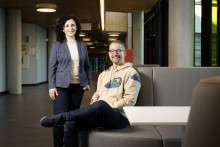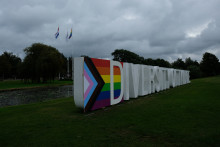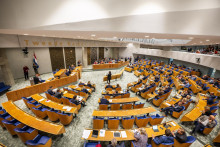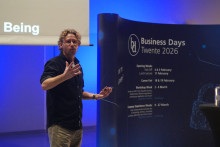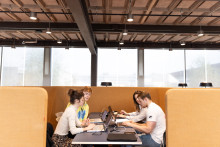De&I board
The DE&I Board (formerly called Ambassadors' Network) advises the UT Executive Board on diversity policies. In recent years, its focus has shifted from advancement of women in academia to diversity in a broad sense. The network consists of UT employees who critically assess and monitor the implementation of Diversity, Equity & Inclusion (DE&I) related measures within faculties and services.
As of this academic year, the Board is led by two co-chairs: Laura Vargas, project coordinator and policy advisor, and Roland van Rijswijk – Deij, adjunct professor of measurement-based Internet Security.
Why did you decide to change the name?
Van Rijswijk – Deij: ‘There was a general consensus among the members that Ambassadors’ Network was no longer a fitting name for us. An ambassador is someone who speaks on behalf of something, but our network tries to pick up on challenges within the community and start a dialogue about them. And we decided to call our organisation a board, because we want to be able to give solicited and unsolicited advice to the Executive Board and faculty boards. Our members all focus on different topics, covering the entire DE&I spectrum. That is our power and we want to maintain it – and maintain the diversity of voices.’
What are the plans of the DE&I Board?
Vargas: ‘We have identified two themes that we want to focus on this year. The first topic is onboarding and welcoming of international employees – PhDs and other staff members. We believe that the UT should become a lot more proactive in welcoming internationals.’
Van Rijswijk – Deij: ‘There are a lot of challenges that come with moving to the Netherlands as an international. For example, as UT we find it completely acceptable to put PhDs in shared housing. That might work for some, but it is completely inappropriate for others. There are PhDs who come here with their partner and even kids. This is just one example. We need to become more welcoming and more aware of these challenges. The solutions to these struggles are now completely dependent on the specific department that is welcoming the employee. Some groups might help you, others won’t. It is too arbitrary and not embedded in a structured systematic approach.’
'Being welcoming means being proactive'
Vargas: ‘Another issue is that, even if people are willing to help, the internationals have to first ask for help. And some of them might not ask, because they may feel ashamed or think it is disrespectful. Being welcoming means being proactive, asking how you can be of help, and being aware of cultural differences in the attitude towards seeking and receiving help.’
Van Rijswijk – Deij: ‘Dual careers is another important topic. Once people come here, you want to keep them here; and that is much easier if both partners have a good position. Right now we only support dual careers by referring people to job websites. We tell them that it’s their own responsibility. But we can do much better than that. It’s engrained in the culture that people need to ask for help, but instead we should put our arm around their shoulder and tell them how we can help them. This topic is very important to us. It’s not only important on a human level, but on a strategic level. We are growing as a university and need to hire more staff. It is a competitive field and there are only that many employees we can find in the Netherlands. We need internationals.’
Vargas: ‘Inclusion is the key to attracting and keeping talent here.’
What is the second theme you want to focus on?
Vargas: ‘The Shaping Expert Group Inclusion report. We want to make sure that it’s implemented in practise. We want to make sure that its findings are translated into policy and action. It is our role to monitor this – and there are a lot of actionable points that we can monitor. It’s the voice of the organisation and needs to be followed up on.’
What type of impact do you hope to have as the DE&I Board?
Vargas: ‘I’d like the board to be a catalyser of conversation and increase awareness. To serve as a facilitator of dialogue. I want to include everyone in the dialogue, also those people who are worried of change and have less knowledge or experience on DE&I topics. We want to achieve a community where people are more mindful of others. But this will take time. This change needs to be gradual in order to be effective.’
'I hope we achieve more consideration for one another'
Van Rijswijk – Deij: ‘I’ll be happy if we can achieve lasting change for the better despite the heated debate and polarisation in society. I hope we achieve more consideration for one another.’
Vargas: ‘As the DE&I Board, we want to be a group of people who can give solicited and unsolicited advice on all DE&I topics. To serve as a thermometer of the UT community, feel what is happening and bring it to the boards. One of the things we want to address in our conversations with the Executive Board is that the time and efforts of already employed staff dedicated to DE&I-related activities should be recognized and rewarded. It should not only be voluntary in addition to the working hours. Showing that we are committed to becoming a more inclusive organization means putting the money where the mouth is: intrinsic motivation needs to be organized, supported, and facilitated.’


